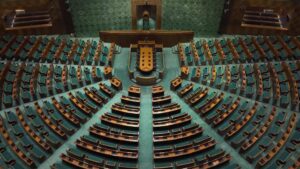GS II-POLITY

Introduction
Parliamentary privileges are rights and immunities granted to members of Parliament individually and collectively to enable them to function effectively.
A breach of privilege occurs when these rights and immunities are disregarded, and it is considered an offence punishable under parliamentary law.
Key Aspects of Breach of Privilege
- Any member of either House can move a privilege motion against an individual found guilty of breaching parliamentary privileges.
- The purpose of the motion is to censure the concerned minister or member.
Role of the Speaker/Rajya Sabha Chairperson
- The Speaker (Lok Sabha) or Chairperson (Rajya Sabha) is the first level of scrutiny for a privilege motion.
- They can either decide on the motion themselves or refer it to the Privileges Committee.
- If accepted, the concerned member is given an opportunity to make a short statement.
Rules Governing Privileges
- Rule 222 (Lok Sabha Rule Book, Chapter 20) and Rule 187 (Rajya Sabha Rule Book, Chapter 16) govern privilege matters.
- A member can raise a question of privilege with the consent of the Speaker/Chairperson regarding any breach involving:
- A member of Parliament
- The House itself
- A parliamentary committee
Parliamentary Privileges – Constitutional Basis
- Defined under Article 105 of the Constitution.
- Two key privileges explicitly mentioned:
- Freedom of speech in Parliament
- Right to publication of parliamentary proceedings
- Who enjoys these privileges?
-
- Members of Parliament (MPs)
- Parliamentary committees
- Union Ministers and the Attorney General of India (as they can participate in parliamentary proceedings)
- President NOT covered under parliamentary privileges (Article 361 provides separate privileges for the President).
- Protection from Arrest: Under the Code of Civil Procedure (1908), MPs are immune from arrest or detention in civil cases:
-
- During a parliamentary session
- 40 days before and after a session
- No Codified Law: Parliament has not yet enacted a comprehensive law codifying all parliamentary privileges.
Privileges Committee
- A Standing Committee that examines cases of privilege breaches and recommends action.
- Composition:
- Lok Sabha: 15 members
- Rajya Sabha: 10 members




